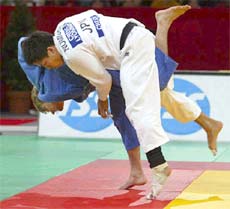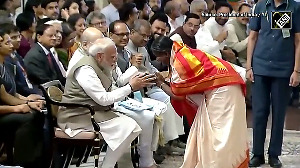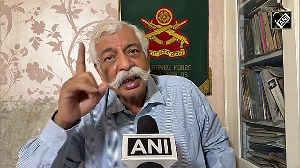 Tadahiro Nomura stands on the brink of greatness in his third and final Olympics. The 28-year-old Japanese won Olympic titles in 1996 and 2000 and could become the first person to win three Olympic judo golds, in the extra-lightweight class.
Tadahiro Nomura stands on the brink of greatness in his third and final Olympics. The 28-year-old Japanese won Olympic titles in 1996 and 2000 and could become the first person to win three Olympic judo golds, in the extra-lightweight class.
Since judo's arrival at the 1964 Tokyo Games, five men have won two titles but despite Japan's domination of the sport, Nomura is the only Japanese in that list.
No woman has yet achieved two titles and Japan's Ryoko Tani, formerly Tamura, could cap her fine career with a second gold at extra-lightweight.
Tamura was a raw 16-year-old when beaten by France's Cecile Nowak in the 1992 final and was a double world champion four years later when she became the shock victim of a little-known 16-year-old from North Korea, Sun Hui Kye.
Tani finally won that elusive Olympic crown in Sydney and, holding back tears, she proclaimed: "It is like meeting your first love again after eight years apart.
Now married and with six successive world titles behind her, Tani will be making her last appearance at the Games.
Athens will be Sun's third Games, astonishingly at three different weight categories. She won gold at under 48kg in 1996, bronze at under 52kg in 2000 and will compete at under 57kg this time around. Sun is already the only person to win three world titles at three different weights.
Her main challenger is likely to be the reigning champion Isabel Fernandez but two rule changes since the last Games have hampered the Spaniard's challenge.
Woman's fights have stepped up from four to five minutes since Sydney and a period of golden score has replaced the referee's flags at the end of the regulation time.
GOLDEN SCORE
The Spaniard's high-tempo, scrappy style, where she often stole fights by appearing more aggressive, was more suited to shorter fights and ill-informed referees.
The new rule is a blessing, though, for most in the sport as gone are the days of controversial refereeing decisions.
Since golden score was introduced, most fights that fail to produce a winner in the allotted five minutes are settled in the first minute of extra time.
The incomparable Kosei Inoue will excite as ever in the men's under 100kg where he is unbeaten at international tournaments since he burst on to the scene as a 21-year-old at the 1999 world championships.
Three world titles and an Olympic crown later, the Japanese is the major draw wherever he competes. His attacking style, based on an unflinching belief that he can throw every opponent for ippon (the equivalent to a knock-out), brings a sense of anticipation every time he steps onto the tatame.
More excitement will come from explosive throwers such as Brazil's Carlos Honorato, Cuba's Yordanis Arencibia and Estonia's Alexsei Budolin.
Argentina's half-middleweight Daniela Kruckower is favourite to take home South America's first gold since Atlanta after winning the world title.
She moved to Israel as a child but decided to represent the country of her birth ahead of the Sydney Games.
However, the biggest cheer at the judo will be reserved for Greece's own Ilias Iliadis whose shock victory at the European championships at under 81kg has thrown up the possibility of a home champion.








 © 2025
© 2025